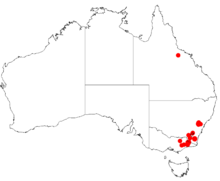| Kybean wattle | |
|---|---|
 | |
| Scientific classification | |
| Kingdom: | Plantae |
| Clade: | Tracheophytes |
| Clade: | Angiosperms |
| Clade: | Eudicots |
| Clade: | Rosids |
| Order: | Fabales |
| Family: | Fabaceae |
| Subfamily: | Caesalpinioideae |
| Clade: | Mimosoid clade |
| Genus: | Acacia |
| Subgenus: | Phyllodineae |
| Species: | A. kybeanensis |
| Binomial name | |
| Acacia kybeanensis | |
 | |
| Occurrence data from AVH | |
Acacia kybeanensis, commonly known as kybean wattle or kybeyan wattle, [1] is a species of plant in the family Fabaceae. It is endemic to south-eastern Australia.